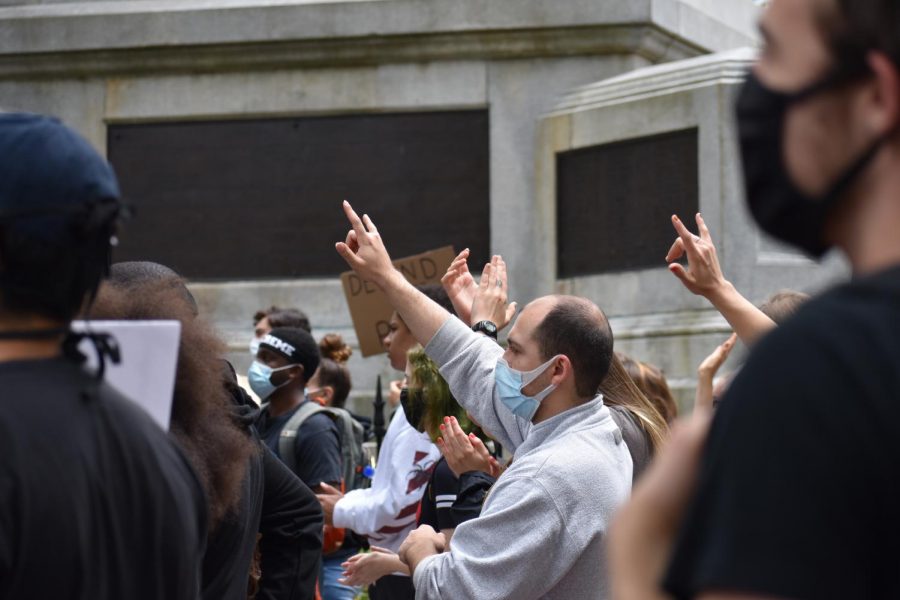Performative Activism: Are You a Part of the Problem?
A protest in Cambridge this past summer.
April 29, 2021
Have you ever posted an infographic about a current issue to make yourself seem like a more caring and politically conscious person? Have you ever felt pressured to show support for a movement when your social media feed is flooded with the trendiest political hashtag? If so, you are not alone; however, you may be participating in performative activism.
Activism is defined by the Merriam-Webster Dictionary as, “a doctrine or practice that emphasizes direct vigorous action especially in support of or opposition to one side of a controversial issue.” Protests, petitions, and rallies are all examples of activism outlined by our Constitution; freedom of speech is integral to the United States’ founding principles. So what makes activism performative? Many corporations and celebrities jump into the hottest political discussions by rebranding or posting tweets and infographics on account of self-interest: to uphold or improve their reputation for profit rather than wholeheartedly helping the cause.
Today, performative activism is most common on social media; for example, after the horrific murder of George Floyd, the Black Lives Matter movement (BLM) became a popular public agenda for both legitimate and performative activism. About a week after Floyd’s death, many social media users participated in Blackout Tuesday, which called for people to post black squares as a way to virtually protest police brutality. Although it was done with great intentions, this counterproductive act of activism was solely performative as it didn’t help the cause. In fact, it spammed BLM resource pages and blocked out useful information regarding the movement.
One of the greatest problems with performative activism is its ability to turn topics and activism into a superficial trend; it makes a mockery out of social issues, and no tangible action is being taken. Twitter hashtags such as #StopAsianHate recently trended after eight Asian-American women were tragically killed in Atlanta. A huge gap exists between posting a hashtag and joining community action to fight against racial discrimination. Change confronting a deep rooted problem will not be achieved by simply writing and posting a three-word phrase. Being able to pick the lowest hanging fruit would create a delusion of self-achievement, which discourages long-term effort for real institutional reform. Thus, there is a vicious cycle of people doing the bare-minimum, allowing social media users to be overexposed to important issues, numbing their significance. Instead, have conversations with friends and family to raise awareness around the issue.
When it comes to trending issues, attention is often short-lived. Take a look at Google search trends for #StopAsianHate. As you can see, the spike in the graph takes place two days after the Atlanta killings on March 16th. A little over a week later, the enthusiasm dropped dramatically. Although there was a second spike, it was not nearly as great as the first one.
Another example of performative activism is the National Football League (NFL) painting “Black Lives Matter” on the end zones of their football fields in 2020. But, four years before, after Colin Kaepernick took a knee during the national anthem to send a message about police brutality and systemic racism, he was denied a spot in the NFL for three years. “We’re waiting for the 32 owners, the 32 teams, Roger Goodell, all of them to stop running—stop running from the truth, stop running from the people,” said Kaepernick. So why was it that after four long years, after the surge of activism around BLM, did the NFL suddenly decide to display their support for millions to see?
Let’s try to make sense of why performatism can hurt a movement substantially. Among many possible explanations, one of which is a social psychological mechanism known as “social loafing.” Social loafing is the idea that people may exert less effort into achieving a goal when they feel that others are working on it as well. The overwhelming amount of awareness and performative activities around a cause may misinform individuals that others are putting effort to positively contribute to an issue. This creates a culture in which no one actively tries to make a change when they think that others are already doing so. In reality, most of social media activism comes from users who are mindlessly spreading information; therefore, little actual change is ever achieved.
Contrarily, performative activism can be a social good. It can help raise awareness about situations and attract people who do not usually participate in politics to learn new information about the problems in our society. Activism of any form can serve as a wake-up call for uninvolved people, which may inspire them to create change. Cian O’Toole ’22 added, “Companies across the world and the United States putting rainbow flags [and] gay pride symbols all over their brand during Gay Pride Month is not a bad thing: yes, it is for their own selfish benefit and reasons. But gay symbols on brands is great and we should not look down upon activism in any of its objective forms, [until] it goes too far.”
Although there are pros and cons to performative activism, it’s important to question whether or not you are being a responsible online citizen. If you want to post something to raise awareness on an issue, ask yourself if you’re willing to do anything tangible outside of social media to support the cause—go to protests, sign petitions, call out people who are contributing to the issue in your life; do whatever you can to support the movement. Ask yourself if information you are posting is from a credible source, if you fully understand the background for the subject matter, and that it is not purely to be personable. Julia D’Amato ’23 suggested, “Ideally we do not improve performative activism, but instead abolish performative activism and turn to real action. This is easier said than done … It’s hard to get people to care about an issue that doesn’t affect [them].” An effective ally is not focused on their image, they are committed to creating positive change.










